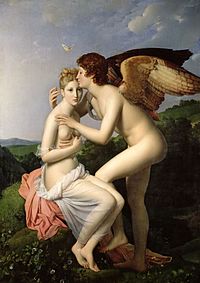
Back Cupido i Psique Catalan Amor und Psyche German Έρως και Ψυχή (Μεταμορφώσεις) Greek پسوخه و کوپیدو Persian Amore e Psiche Italian Cupid lan Psyche JV Psice e Eros LFN Erotas ir Psichė Lithuanian ကျူးပစ်နှင့် ဆိုက်ကီး Burmese Cupid og Psyche NB

| Part of a series on the |
| Greek underworld |
|---|
| Residents |
| Geography |
| Prisoners |
| Visitors |
Cupid and Psyche is a story originally from Metamorphoses (also called The Golden Ass), written in the 2nd century AD by Lucius Apuleius Madaurensis (or Platonicus).[2] The tale concerns the overcoming of obstacles to the love between Psyche (/ˈsaɪkiː/; Ancient Greek: Ψυχή, lit. 'Soul' or 'Breath of Life', Ancient Greek pronunciation: [psyːkʰɛ̌ː]) and Cupid (Latin: Cupido, lit. 'Desire', Latin pronunciation: [kʊˈpiːd̪oː]) or Amor (lit. 'Love', Greek Eros, Ἔρως), and their ultimate union in a sacred marriage. Although the only extended narrative from antiquity is that of Apuleius from the 2nd century AD, Eros and Psyche appear in Greek art as early as the 4th century BC. The story's Neoplatonic elements and allusions to mystery religions accommodate multiple interpretations,[3] and it has been analyzed as an allegory and in light of folktale, Märchen or fairy tale, and myth.[4]
The story of Cupid and Psyche was known to Boccaccio in c. 1370. The first printed version dates to 1469. Ever since, the reception of Cupid and Psyche in the classical tradition has been extensive. The story has been retold in poetry, drama, and opera, and depicted widely in painting, sculpture, and even wallpaper.[5] Though Psyche is usually referred to in Roman mythology by her Greek name, her Roman name through direct translation is Anima.
- ^ Dorothy Johnson, David to Delacroix: The Rise of Romantic Mythology (University of North Carolina Press, 2011), pp. 81–87.
- ^ Lewis, C. S. (1956). Till We Have Faces: A Myth Retold. Harcourt Brace Jovanovich. p. 311. ISBN 0156904365.
- ^ Stephen Harrison, entry on "Cupid," The Oxford Encyclopedia of Ancient Greece and Rome (Oxford University Press, 2010), p. 338.
- ^ Wagenvoort, H. (1980). "Cupid and Psyche". Pietas. pp. 84–92. doi:10.1163/9789004296688_007. ISBN 9789004296688.
- ^ Harrison, "Cupid and Psyche," in Oxford Encyclopedia of Ancient Greece and Rome, p. 339.